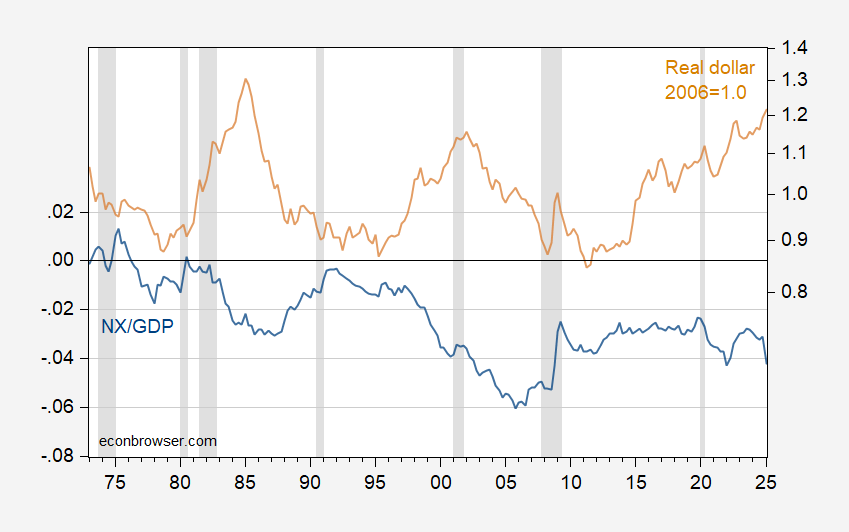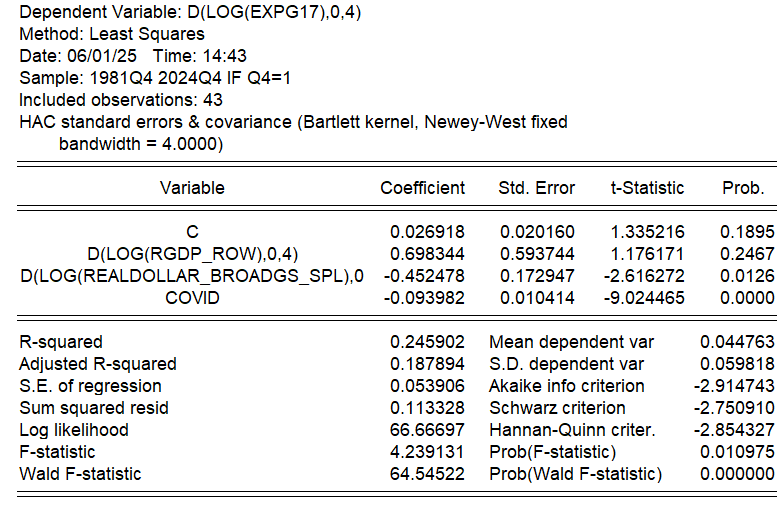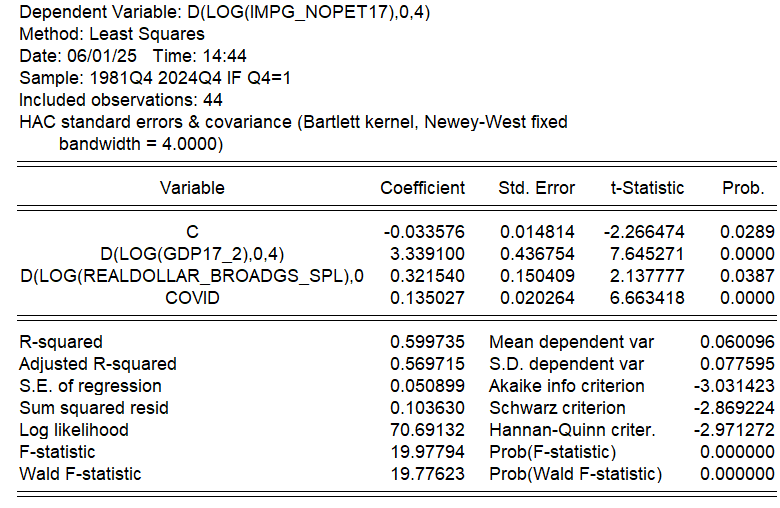That would explain a lot. He’s not very effective at much, but he is effective at setting the preconditions for a recession. From Yahoo!Finance quoting the Kobeissi Letter:
“In a way, President Trump may actually want a recession,” the post says. “A recession achieves most of Trump’s economic goals at once,” referring to his campaign promises of low inflation, treasury yields, a reduction in trade deficits, a rate cut by the Federal Reserve, and lower oil prices.
As I’ve discussed before, it’s hard for tariffs (a microeconomic tool, with sometimes macro consequences) to substantially reduce the trade deficit especially when foreign countries can retaliate.
I wondered, then, what it would take to get the trade deficit to zero, by way of exchange rate depreciation or recession (or, expenditure switching vs. expenditure reduction). Consider the following graph.
Figure 1: Net exports to GDP (blue, left scale), and real value of US dollar, 2006M01=1 (tan, right log scale). NBER defined peak-to-trough recession dates shaded gray. Source: BEA 2025Q1 second release, Federal Reserve, and NBER.
Note that some observers have indicated 20-30% as a reasonable number. One of those is Peter Hooper who at the Fed coauthored a well known paper on trade elasticities; however, I think the 20-30% figure is a number which incorporates other effects besides just the relative price effects).
In order to answer the question of required depreciation, we need elasticity estimates. Without going into extensive calculations, I obtained some back of the envelope estimates (for more detailed analyses, but on older data, see here).
These are regressions of y/y growth rates, non-overlapping (sampled at Q4) for goods exports on rest-of-world US export weighted GDP and real value of dollar, and for non-oil goods imports on US GDP and real value of the dollar, along with a Covid dummy (imports, exports, GDP in real terms).
Confirming my earlier estimates, export price elasticities are higher than non-oil import price elasticities, and import income elasticity is very high.
Using these estimates, I conduct back of the envelope calculations to see what changes are needed for an elimination of the 1053 bn Ch.2017$ reduction the net export deficit (2024Q4 numbers).
By my calculations, a 20% real depreciation of the dollar only gets one about a third of the way (326 bn), while a 1.4% reduction in GDP relative to trend will zero out the trade deficit, assuming the rest-of-the-world does not experience any decline (so that US exports are stable). While 1.4% doesn’t sound like a large number, given a baseline growth rate of 1.8%, this implies about a 3.2% decline relative to baseline.
Using the SPF forecast, this implies GDP would have to be 23197 vs 23952 in 2026Q2.
Figure 2: GDP (bold black), SPF May forecast (tan), and level of GDP necessary to balance real net exports (green square), all in bn.Ch.2017$ SAAR. Source: BEA 2025Q1 second release, Philadelphia Fed, and author’s calculations.
By the way, how can one get a dollar depreciation? Lowering interest rates (which would spur aggregate demand, tending to increase imports), destroying confidence in the dollar as a safe haven (been there, done that…but I guess the Trump administration could do more), or force foreign countries to appreciate their currency (e.g., China, Korea, Taiwan). Not sure that’s feasible, but I’m sure the Trump team will do their darndest.




Trump has already told you he wants a recession. He very clearly stated there would be pain in the economy. He did not hide that fact, he just avoided using the term recession.
A 2025-26 recession like 1981-82 followed by a 2028 recover and they can dust off Morning in America Again. Blame Carter, blame Biden. No difference.
I don’t think he actually has a recession as a goal. But someone has been complaining to him about all the negative effects of what he is doing. So he has moved past the outright denying that anything bad could come from this into the next toddler narrative – “sure something bad can come, but it will be so much better in the long run”
The felon-in-chief’s demands for eliminating the trade deficit, lowering interest rates and weakening the dollar are all justified by the claim that they’ll all be good for the economy. Now, we can have different definitions of “good for the economy”, but lower employment, lost income to households, governments and businesses, higher inflation and lower investment all seem bad to me.
Now, the felon and his fellas seem to be arguing that a recession would eventually make the economy stronger. Again, we can disagree about what that means, but anything which doesn’t persistently raise trend growth and improve real compensation among the poorly compensated seems to me to be a waste. Somebody’s favorite chart goes up a little faster – whoopy… A favorite chart or two improving is not the same as “good for the economy”. Recession isn’t good for the economy. Homelessness and hunger, inadequate health care – not good for the economy.
Indeed – Trump’s apparent understanding of international macroeconomics is akin to someone needing to take off his shoes to count past 10.
trumps economic policies are going to add trillions to the debt. he is going to be paying over a trillion dollars annually just on the interest to the debt. and his program is to add even more debt? it just amazes me that outspoken critics of debt, such as rick stryker, bruce hall and corev seem to be embracing the $1 trillion dollar annual interest bill along with an increase of the debt by many trillion dollars more. what happened to all that fiscal discipline? it makes no sense that i am going to get a tax cut fueled by treasuries with a debt limit that republicans do not want to increase. these guys have serious mental problems.
Trump wants to remake the United States into a s***hole country – it is obvious from the Trump administration’s taking away funding for healthcare and research and education.
One interesting example – “President Donald Trump has made matters worse by freezing $4 billion in Inflation Reduction Act funding earmarked for protecting the Colorado River. Securing the water supply of millions of Americans in one the fastest-growing regions in the country deserves more research and funding, not less.”
By the way – we may run out of water before we run out of energy – https://www.bloomberg.com/opinion/articles/2025-06-02/arizona-s-water-is-vanishing-before-ai-gets-a-crack-at-it
The anti-science and climate change is not real argument/position of the Trump admin/GOP/Fox News is becoming untenable: https://nsidc.org/sea-ice-today/sea-ice-tools/charctic-interactive-sea-ice-graph
chaos does not bother trump, because he is not beholden to any set of rules like the rest of society. he has a great survival instinct. there are some animals who eat their own young for the very same reason.
He is crazy enough and stupid enough that it makes sense. He has also demonstrated vast reservoirs of cruelty.
Another thing a recession would accomplish is less migration to the United States. Add that to the list.
They could care about migration little. The slowing of the job market to 100000 jobs a month(where revisions will end up) private sector had already done that by the fall of 2024. Its just more grifting.
For some individuals a recession have positives. You get fire-sales on certain assets – and labor cost is reduced.
For the economy and the country, a substantial increase in unemployment is always bad. Every unemployed person represents a loss of production that will never be fully recovered. The 40h/week worker who sits idle for 6 months will not work 80h weeks for 6 months after he regain employment. Most likely he will reduce consumption for an extended period of time even after getting another job – while trying to recover from debt build up during unemployment.